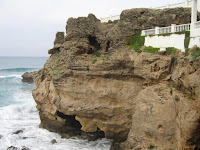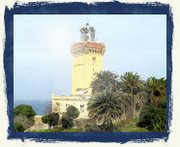 Overview
OverviewMorocco is located in northern Africa but only 3 hours away from the UK and only 35 minutes away from Spain at Algeciras and Tarifa by fast ferry. Morocco is very diverse geographically with huge stretches of coast both on the Atlantic side and on the Mediterranean side. Internally there are great plains and three large mountain ranges where in places skiing is possible. A big part of the country is covered in desert providing some hot weather for the southern part of the country. The power in Morocco has changed hands a number of times in the past century - divided up between Spain, France and Britain - along with centuries of Moorish and Berber culture Morocco has a very interesting mix of new and old.
The country still has strong ties with Spain who retain a number of enclaves (much like Gibraltar) at Ceuta, Melilla, Penon de Velez de la Gomera and Penon de Alhucemas. It also retains close links with France, and Morocco is a popular holiday destination for the French. The legal system along with the education system is modelled around the French system. Morocco has good relations and strong links with the UK and America with strong textiles and manufacturing with M&S having around 30% of its knitwear produced in Morocco.
Things began to change in 1999 when the new King Mohammed VI came to power. The new King is a reformist moderniser and he has set about improving links with the rest of the western world and improving human rights, corruption and religious extremism, as well as introducing more equality for women. The King was educated in Europe and spent lots of time in America and France where he studied law and wrote a number of prominent articles regarding the North Africa MAGREB (Morocco, Algeria and Tunisia) countries. An interesting fact is that the King was once an international standard golfer
After 6 years of power, Morocco seems a stable place to invest with low inflation and a stable currency - the Dirham. The currency is not fully exchangeable outside Morocco but is worth around 16/£ and 11/Euro it moves very much in line with the Euro.
There are no laws or complications that would stop foreigners investing in property or land and the legal system is based on the French system with notaries which some of you may be familiar with. The legal costs are around 5%, much less than the 10-15% in France and Spain.
 Infrastructure
InfrastructureKey areas of improvement are employment and tourism. In 2004 the tourism figures were around 5.6m. This involved huge investment of $5bn from the King and his Government and large investment in the ports areas from the Americans. There is a huge port being built in between Tangier and Tetouan - provisionally named the Golden Mediterranean. This will take freight away from Tangier port, returning it to a more tourist destination. The new port is intended to be the main hub into Africa, with good road links being built in the surrounding areas. Americans have the contract for the port, bringing foreign investment into the area.
These projects involve the improvement of the roads - a new motorway between Tangier and Tetouan is being built along with the new airport at Tangiers. The new motorway will make a good coast road and inevitably new developments will spring up around it, as the coast is not very well populated unlike Spain. The main property areas offering the widest choice of property are around Tangier on the northwest tip, Casablanca on the Atlantic coast and inland at the very cosmopolitan Marrakesh. Inland and the Atlantic coast have fairly established tourist resorts and therefore property prices tend to be higher but there are new developments along the Atlantic coast offering value for money along with most of the cities which still have riads (old traditional houses set around a courtyard) at realistic prices and with many needing either some TLC or major renovation. Access has been the problem in the past even though Morocco is so close to Spain but with the investment in infrastrcuture, this is changing fast.
Airports are being upgraded and new ones built, with a new airport at Tangier and with the ‘Open skies agreement’ being signed ahead of the 2007 schedule in December 2005, Monarch, RyanAir and EasyJet have all been rumoured to have signed up to Tangiers and Tetouan airports. EasyJet have recently announced that they would fly into Marrakech from £31 which will open the floodgates for bargain flights. There are rumours that EasyJet will fly to Tangier next.
These deals will begin to accelerate in 2006, as Morocco is very much an untested market for the budget airlines. It will also put pressure on the flag carrier Royal Air Maroc to follow suit - it has recently committed to increasing its fleet by 50% in 2007.
Tetouan which is about 1 hours drive west of Tangiers. It has an international airport that is little used, but the large hotel groups, Club Med/Sofitel/Accor in the area have been lobbying the governor to open it up more regularly as it is currently being used for internal flights only. Car rental at the moment is expensive but this should change when the budget airlines become more established.
A new train station has just been built at Tangier and the train network in Morocco is excellent. It was built by the previous European rulers, France and we all know how good the French train system is! In 2008 there are plans to build a road and rail tunnel from Gibraltar. There is a plan to build hotels housing approximately 60,000 beds. Most of this development will take place in two main areas - Tangiers-Tetouan and Saidia. This is estimated to take place between now and 2010 and there are also funds for existing Moroccan hotels to apply to upgrade and refurbish.
 Rentals
RentalsThe season on the Mediterranean coast currently lasts for 10-12 weeks and housing demand exceeds supply which results in high peak rental rates. The demand comes mainly from Moroccans travelling back from Spain and France and travelling north as the weather is cooler than the southern part of the country.
A two-bed apartment fetches around 150 euros per night in the peak season and around 75 euros per night outside July/August as many amenities close down outside of these dates.
The key to improving yields is to extend the season to a more European market after flights direct from the UK open up. Assuming you managed to rent 85% of the peak weeks this would equate to 8,000 euros before costs, which would more than cover costs for the year. Anything outside the peak season would be a bonus, and with 330 days of sun there should be plenty of opportunity.
Most developments provide full management services along with collections to and from the airports if necessary. Unlike Spain, site charges are only expected to be around 400 euros per year. Tax of rental income is exempt for the first five years and capital gains tax is also exempt below £40,000 with the rate after this being 20%. There are also no inheritance tax laws, this is only subject to an administrative charge and full repatriation of funds is also in place
 Weather
WeatherThe weather is fairly consistent for much of the year with lows in December/January at around 60 degrees and the high season in the early 90’s. Morocco claims to have around 330 days of sunshine, which is the same as Spain.
 Finance
FinanceMost investors are buying with cash, or developers are underwriting 60-70% LTV. This means deposits of 30-40% are likely although this will reduce over time as the market matures and when capital becomes more available - many of the Moroccan banks are French owned. I have spoken to Simon Conn at Mortgagesoverseas.com and he said, ”They are currently working on a couple of products in Morocco and we hope to have this up and running within the next 3-6 months
 Cost of living
Cost of livingGenerally, Morocco is not a rich country with average daily wages around the 10-euro mark. Therefore the basket of goods is much lower than Spain and the UK. The only item, which can be more expensive, is alcohol as Morocco is a Muslim country.
- A cup coffee in an upmarket Tangier Café is about 8 dirham which equates to 50p
- A meal for 2 in Tangier Mogodom restaurant including wine was 250 dirham, which equates to only £15
In Conclusion
- Property prices are very good value being less than half of that in Spain.
- Huge investments in tourism infrastructure by the government.
- The economy very stable as is the currency with good GDP growth and inflation under control
- Build quality is good and more that comparable to Spain.
- Good rental yields are achievable.
- Tourism increased 18% in 2004.
- Good capital appreciation is achievable.
- Good climate all year around.
- Improving access to finance.
- Cost of living so much lower than Spain/UK




1 comment:
Morocco is a beautiful country, with its ancient towns, coastal resorts and snowy peaks. This North African kingdom boasts 1,400 miles of coastline, year-round sunshine and an open invitation to tourists and investors all over the world. And most of all I like Tetouan, it is a picturesque city offering property situated among pomegranate, orange and cypress trees. With one of the oldest old towns in Morocco where local traders sell traditional crafts in the intertwined streets with its marble fountains, royal palace and orange groves. And I see that Tetouan Property is a very attractive investment option - prices of some coastal properties on the Atlantic Coast and Mediterranean Coast have doubled over the last year and are still rising. The scenic beauty of Morocco and the pleasant weather make it ideal for holiday homes, retirement homes or as an appreciating property investment. So make sure you purchase your own Moroccan property while it is still affordable.
Post a Comment